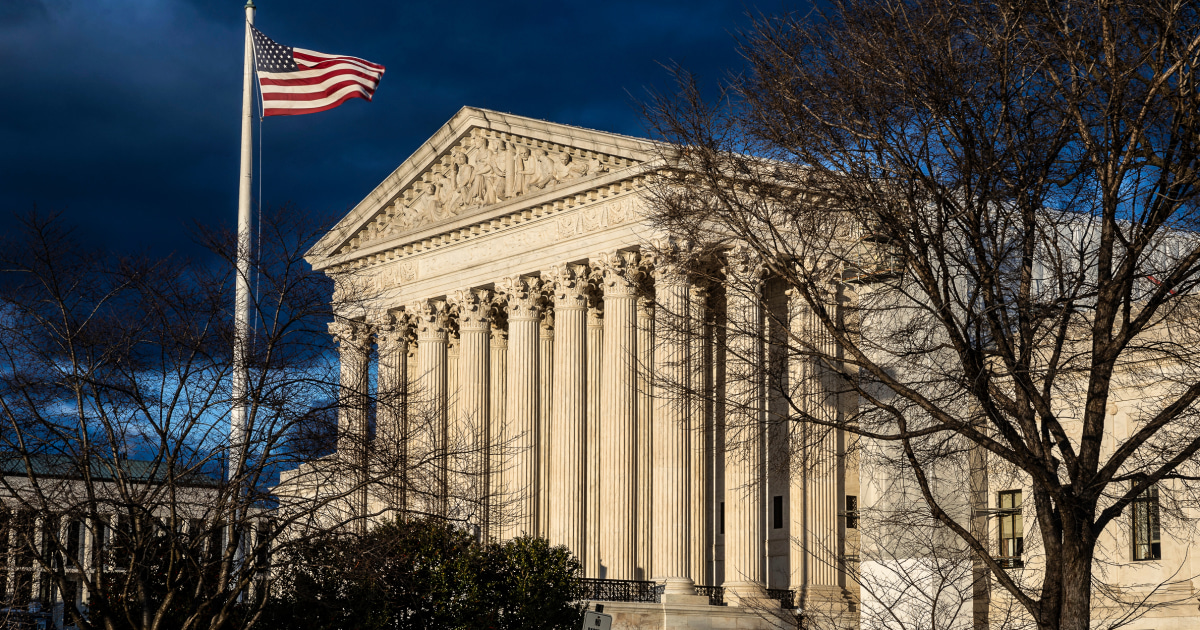
Supreme Court justices express free speech concerns about GOP-backed social media laws
Laws enacted in Texas and Florida would restrict social media companies' ability to decide what user content they wish to publish.
Supreme Court justices express free speech concerns about GOP-backed social media laws
Laws enacted in Texas and Florida would restrict social media companies' ability to decide what user content they wish to publish.Nikki Haley says she won’t give up after losing South Carolina GOP primary
Feb. 26, 2024, 6:59 AM EST / Updated Feb. 26, 2024, 3:21 PM EST
By Lawrence Hurley
WASHINGTON — The Supreme Court on Monday grappled with knotty free speech questions as it weighed laws in Florida and Texas that seek to impose restrictions on the ability of social media companies to moderate content.
After almost four hours of oral arguments, a majority of the justices appeared skeptical that states can prohibit platforms from barring or limiting the reach of some problematic users without violating the free speech rights of the companies.
But justices from across the ideological spectrum raised fears about the power and influence of big social media platforms like YouTube and Facebook and questioned whether the laws should be blocked entirely.
Trade groups NetChoice and the Computer and Communications Industry Association, known as CCIA, say that both laws infringe upon the free speech rights of companies under the Constitution’s First Amendment by restricting their ability to choose what content they wish to publish on their platforms.
First Amendment free speech protections apply to government actions, not those by private entities, including companies.
"Why isn't that, you know, a classic First Amendment violation for the state to come in and say, 'We're not going to allow you to enforce those sorts of restrictions'?" asked liberal Justice Elena Kagan, in reference to the Florida law's content moderation provisions.
As Chief Justice John Roberts put it, because the companies are not bound by the First Amendment, "they can discriminate against particular groups that they don't like."
Some justices, however, suggested the laws might have some legitimate applications against other platforms or services, including messaging applications, which could mean the court stops short of striking them down.
The eventual ruling could lead to further litigation in lower courts as to whether the laws should be blocked. Both are currently on hold.
"Separating the wheat from the chaff here is pretty difficult," said conservative Justice Neil Gorsuch.
Fellow conservatives Clarence Thomas and Samuel Alito seemed most sympathetic to the states.
Alito at one point appeared openly mocking of the concept of content moderation.
"Is it anything more than a euphemism for censorship?" he asked.
The laws were enacted by the Republican-led states in 2021 after Twitter, Facebook and others banned former President Donald Trump after his effort to overturn the 2020 presidential election ended in his supporters storming the U.S. Capitol on Jan. 6, 2021.
This was before Twitter was taken over the following year by billionaire Elon Musk, who has allied himself with conservative critics of the platform and allowed various banned users, including Trump, to return.
Both laws seek to impose restrictions on content moderation and require companies to provide individualized explanations to users when content is removed.
The Florida law among other things prevents companies from banning public figures running for political office and restricts “shadow banning,” whereby certain user content is made difficult to find by other users. The state claims that such actions are a form of censorship.
The Texas law similarly prevents platforms from banning users based on the views they express. Each law requires the companies to disclose their moderation policies.
The states seek to equate social media companies with the telecommunications industry, which transmits speech but has no editorial input. These “common carriers” are heavily regulated by the government and do not implicate free speech issues.
As the argument session unfolded it appeared clear that justices were concerned the laws could apply well beyond the traditional social media giants to companies like Uber and Etsy that allow some user-created content.
Similarly, some social media companies, including Facebook, allow direct messaging. One of the biggest tech companies, YouTube owner Google, operates the Gmail email service.
Application of the laws against direct messaging or email services would not raise the same free speech concerns, and justices seemed hesitant about blocking the laws entirely.
"It makes me a little nervous," said conservative Justice Amy Coney Barrett.
The cases have a political edge, with President Joe Biden’s administration filing a brief backing the legal challenges and Trump supporting the laws.
In May 2022, after the New Orleans-based 5th U.S. Circuit Court of Appeals declined to put the Texas law on hold, the Supreme Court stepped in, preventing it from going into effect. Then, four of the nine justices said the court should not have intervened at that stage.
The Florida measure was blocked by the Atlanta-based 11th U.S. Circuit Court of Appeals, prompting the state to appeal to the Supreme Court.
The challenges to the Texas and Florida laws are among several legal questions related to social media that the Supreme Court is currently grappling with.
A legal question not present in the case but lurking in the background is legal immunity that internet companies have long enjoyed for content posted by their users. Last year, the court sidestepped a ruling on that issue.
Alito suggested the social media companies were guilty of hypocrisy in adopting a free speech argument now when the liability shield was premised on them giving free rein to users to post whatever they want.
He paraphrased the companies' arguments as: "It's your message when you want to escape state regulation. But it's not your message when you want to escape liability."